|
TRANSLATE THIS ARTICLE
Integral World: Exploring Theories of Everything
An independent forum for a critical discussion of the integral philosophy of Ken Wilber
Allen Stewart is a past ACT Chapter President of the
Australian Institute of Project Management and currently works as an
independent project management consultant and trainer. Allen is also a part
time lecturer at the University of Technology Sydney. For discussion on this
article Allen can be contacted by email:
[email protected]
Integral Project
Management
The Next Step in the Development
of Project Management Excellence
Allen Stewart
The collective opinion of project managers consistently identifies leadership,
team development and communications at the top of the list of knowledge, skills
and attributes required for the performance of successful projects. However,
while there is agreement on what is required, the development of project
managers and project teams through current approaches to training does not
reliably deliver improved performance. This paper looks outside of the project management profession to current
developments in the disciplines of philosophy and psychology for some new
thinking on how best to address the soft issues in the project environment.
Emotional Intelligence and Integral Theory are examined as the foundation for a
new approach to more successful projects through the development of Integral
Project Management.
Introduction
Leadership, team development and communication consistently top the list of
knowledge, skills and personal attributes considered necessary for project
success[1]. There are numerous books and training courses designed to improve
these important aspects. However, most of these are knowledge based and
mechanistic. Simply following the steps in process fashion does not
necessarily deliver the desired outcomes. Knowledge based training in these
subjects does not reliably achieve improved performance. How then, are the
skills and personal attributes to be developed?
There is general recognition that the management of people, the human factor,
is critical to project success. However, these so-called 'soft issues', up
until now, have not had a solid theoretical and practical framework for either
developing these skills or applying them in a project environment.
Looking Outside the Profession
Perhaps the profession needs to be less introspective and look beyond the
project management environment to see what is happening in other disciplines
for guidance and clues to the possibilities of how the profession might
develop. There are many places to look but in the field of human resource
management, the study of psychology and philosophy offer some promise and
reflect what I have found to be of the most value. There are two areas of
particular interest that appear to neatly intersect - Integral Theory and
Emotional Intelligence. Both of these provide solidly researched theoretical
frameworks to inform assessment, training and practice.
Integral Theory
The first area, Integral Theory, as presented by Ken Wilber (founder of the
Integral Institute, see www.integralinstitute.org) is from the disciplines of
philosophy and psychology. Wilber's writings attempt to highlight the
connections between as many areas of human endeavour and knowledge as possible.
Some of his more audacious titles include 'A Theory of Everything', and 'A
Brief History of Everything'. Wilber is the most published academic author in
the United States and his work has now been published in over 24 languages.
Integral Theory may appear a little abstract to the reader at first, but once
some of the basic tenets are understood, the power of Integral Theory and its
applicability to the project management environment may be appreciated.
Integral Theory is based on the proposition that fundamentally, every knowable
thing can be conceived as a holon. A holon is complete in itself (whole) but
it also forms part of a larger whole. Thus, a holon is both part and whole.
For example, an atom is complete in itself but is a part of a molecule, which
can be a part of any number of physical structures. Other examples are that an
individual human is a part of a family, and also part of a community that is
part of a country. A letter is part of a word, which is part of a sentence,
which is a part of a paragraph, which is also part of an article or story in a
higher level or broader context.
The basic structure of all things is therefore a holarchy. A holarchy is like
a hierarchy, but it actually occurs naturally. Maintaining a self-organising
balance, a holarchy is a series of wholes, which are part of other broader
contexts or wholes, and this series develops indefinitely.
Wilber's analysis concludes that if a holon fails to balance its wholeness and
communion with others at its level, then it will collapse and cease to exist.
If it ceases to exist, the consequences are that everything above it in the
holarchy would also collapse[3]. For example, if a hydrogen molecule were to
collapse then so too would the water or other structures it comprised; if a
letter ceased to exist then so would the word, sentence and paragraph it was in.
Wilber observes that each holon (and every holarchy) has at least four
fundamental, different, irreducible dimensions of existence. These can be seen
as four types of 'truth', actively pursued by different disciplines. These are
illustrated in Figure 1.
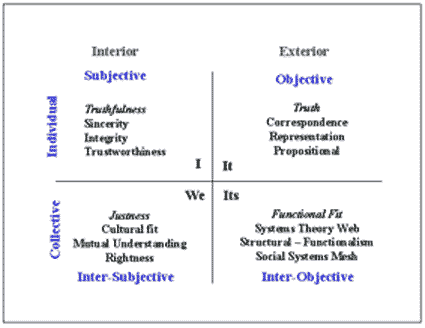
Figure 1 – Wilber's Four Quadrants of Every Holon
Wilber's proposition is that each of the four quadrants of each holon must
develop in balance with each other (or tetra-evolve). If one quadrant develops
at a faster rate than the others, the holon will exhibit unhealthy distortions
retarding the holon's functionality with the other holons at its level and
above. Eventually, the holarchy will collapse back to a level of balance
before it can undertake further sustained development.
There are many examples where this has occurred. One example, from an
historical perspective, is that the church, the principal keeper of societies
values, once dominated also the individual, science and the state. This
dominance was out of balance and it restricted the development of the
individual, science and societies. Eventually, the power of the church
collapsed paving the way to revolutionary scientific enlightenment. Science
caught up, however empirical science currently tends to dominate most human
endeavours in the modern world. See Figure 2.
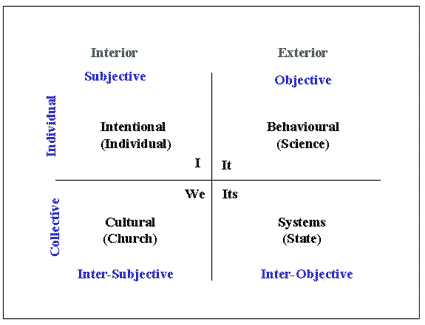
Figure 2 – An example
How does Integral Theory relate to Project Management?
If project management is viewed as a holon, then the characteristics of the
right two quadrants are a project's behaviour and systems. They are the
aspects only described in "It" and "Its" language, the "hard issues", and they
are observable, quantifiable, and measurable. The behavioral, top right
quadrant or "It" includes cost, time and other resource estimates and
actualities, work breakdown structures, scheduling, and specific risks. The
systems, lower right quadrant or "Its", includes project management systems,
such as, the risk management system, cost capture systems, quality management
system and earned value systems.
The overall characteristics of these hard issues on the right side, the
technical and systems side of project management, are that they are objectively
definable. They are measurable, quantifiable, and definable. In essence, they
are observed and measured on their surface characteristics and can be readily
identified. They are relatively easy to teach and learn, and from a competency
standard perspective, they are relatively easy to monitor and measure.
The top left quadrant or "I" is directly related to the individual project
manager or individual project team members; their individual skills,
experiences, strengths and weaknesses, attitudes and motivation. The bottom
left quadrant or "We", is the project team and includes team values, culture
and norms. The project management quadrants may appear as illustrated in
Figure 3.
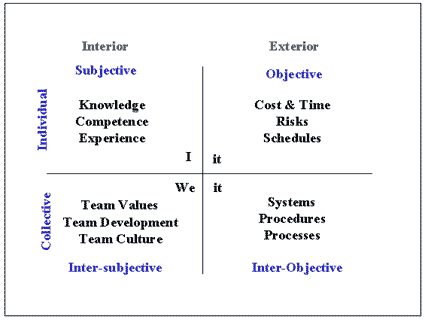
Figure 3 – The Project Management Quadrants
The overall characteristics of the left side, the soft issues, are that they
are qualitative and represent the subjective perspective and experience of
humans; as individuals and collectively as cultures. While some individual
skills can be objectively observed, they predominantly require interpretation.
Humans, other than their external characteristics, are not as easily measured
and observed - they have depth. Communication is required to find out just
what is happening. However, the communication process involves interpretative
frameworks or filters for each participant. We speak through filters and
listen through filters and these can distort or obscure the true meaning or
intent of the communication, both conscious and unconscious. Both the speaker
and listener interpret according to their own experience and filters, and both
are also impacted by their individual emotional states, or feelings, at that
moment in time.
Another difficulty with the soft issues is that they are not easily definable,
and there is greater difficulty in teaching and learning how to improve
individual and team characteristics, particularly from a knowledge perspective.
The soft and hard aspects are shown as an over-lay in Figure 4.
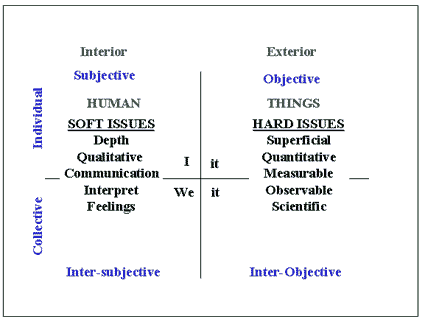
Figure 4 – Soft and Hard Issues
If current project management practice were reviewed as a holon, then a
critical review would suggest an imbalance between the soft and hard aspects of
projects. The further development of the technical skills, processes and
systems should not be restrained, but rather, our individual project leadership
and team development skills require greater development. Emotional
Intelligence provides a means to address the imbalance.
Emotional Intelligence
Emotional Intelligence is from the discipline of Psychology. In 1995, Daniel
Goleman wrote a book titled "Emotional Intelligence"[2] outlining the compelling
case for Emotional Intelligence or EI (also referred to as EQ), as the critical
factor in what sets top performers and teams apart. Research has shown that:
-
Top performers have an EI ratio of 2:1 to technical skills
-
EI accounts for 85% of what sets top project leaders apart from their peers
-
Project teams with leaders with a high EI perform 20% above other teams
Goleman defines EI as "the capacity for recognising our own feelings and those
of others, for motivating ourselves, and for managing emotions well in
ourselves and in our relationships". EI describes abilities distinct from, but
complimentary to, academic intelligence, the purely cognitive capacities
measured by IQ. Current research on EI can be seen at
www.eiconsortium.org
.
Goleman's original description of the EI competencies is:
|
Personal Competencies
|
Social Competencies
|
Self Awareness
Emotional Awareness
Accurate Self-Assessment
Self Confidence
Intuition
Self Regulation
Self Control
Trustworthiness
Conscientiousness
Adaptability
Innovation
Motivation
Achievement Drive
Commitment
Initiative
Optimism
|
Empathy
Understanding Others
Developing Others
Service Orientation
Leveraging Diversity
Political Awareness
Social Skills
Influence
Communication
Conflict Management
Leadership
Change Catalyst
Building Bonds
Collaboration & Cooperation
Team Capabilities
|
Integration of Integral Theory and Emotional Intelligence
One of the most important aspects of the Emotional Intelligence competencies is
that they can be assessed through a growing number of available tests. They
can also be taught and developed. If a project manager and his team can learn
how to improve their EI, then the profession has a means of ensuring that a
balance is achieved between the soft and hard issues.
Integral Theory indicates that a balance must be maintained between the
technical competencies (or right two quadrants) and the personal and team
competencies (or left two quadrants) for the most effective and efficient
project management and for its continued improvement. The EI competencies
provide a means to restore the current imbalance in project management
practices.
The integration of the EI competencies on the Integral Theory over-lay is shown
is Figure 5.
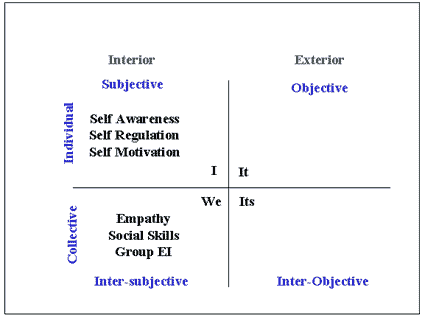
Figure 5 – Integration of Integral Theory and Emotional Intelligence
Application to All Aspects of Project Management
Integral Theory can be applied to all project activities, as each element is in
itself a holon; complete in itself but also an important part of the greater
whole. One example is the predominantly quantitative approach to Risk
Management. It is out of balance if it does not include the subjective human
resource elements. From an EI perspective, risk or uncertainty is better
assessed from an optimistic viewpoint. In addition, a project team's optimism,
motivation, confidence, and relationships with stakeholders also have a
significant qualitative impact on team performance in the face of uncertainty
that is characteristic of all project environments.
Another example is that Project Management Plans are often developed in the
tendering stage and suffer from a lack of participation and ownership by the
project manager and project team who will do the work. The technical plans are
produced but will often need to be redeveloped, either during the negotiation
stage or immediately after contract signature, to ensure that the project
manager and project team are able to establish ownership of the project and
develop the norms required for effective team development.
Significance to Project Management
Our current practice of project management suffers from an imbalance. This
lack of balance can be attributed to our inability to assess and develop
competency in the management of the 'soft issues' rather than an over
development in the technical competencies.
This balance can be assessed and monitored using an Integral approach and the
EI competencies. These approaches and frameworks can also guide the
implementation of corrective action. The EI competencies can be used to assess
and develop personal and team competency in the project environment.
Should EI competency be included in the project management competency standards?
Through the Integral Institute, there are currently hundreds of leading
academics and practitioners around the world reviewing many areas of human
endeavour in the light of Integral Theory for its application to medicine,
science, business, architecture, organisations, etc. The Integral Institute is
encouraging a revolution in thinking and is keen to see many textbooks
rewritten from an integral standpoint. Wilber has already written 'Integral
Psychology'.
Is Integral Project Management, using the Emotional Intelligence competencies
the way of the future? I think so!
Acknowledgement
The author would like to acknowledge his son, Christopher, for his expert
advice on Integral Theory, his enthusiasm, and his constructive comments in
developing this paper.
Notes:
-
Lynn Crawford, 'Profiles of Top Project Managers; the Senior Management
Perspective', Australian Project Manager, March 2002, Volume 22 Number 1, page 5
-
Daniel Goleman, 'Emotional Intelligence. Why it can matter more than IQ',
Bloomsbury Publishing, 1996
-
Ken Wilber, 'A Brief History of Everything', Ken Wilber, Hill of Content
Publishing, 1996, pages 20 to 30.
|




